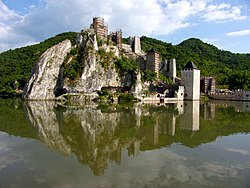Golubac Fortress
| Golubac Fortress | |
|---|---|
| Golubac, Serbia | |

Golubac Fortress
|
|
| Coordinates | 44°39′39″N 21°40′40″E / 44.660717°N 21.677914°E |
| Type | Fortification, mixed |
| Site information | |
| Open to the public |
Yes |
| Site history | |
| Built | 14th century |
| Materials | Stone |
The Golubac Fortress (Serbian: Голубачки град or Golubački grad, Hungarian: Galambóc vára, Bulgarian: Гълъбец, Romanian: Cetatea Golubăț, Turkish: Güvercinlik Kalesi) was a medieval fortified town on the south side of the Danube River, 4 km downstream from the modern-day town of Golubac, Serbia. The fortress, which was most likely built during the 14th century, is split into three compounds which were built in stages. It has ten towers, most of which started square, and several of which received many-sided reinforcements with the advent of firearms.
Golubac Fortress has had a tumultuous history. Prior to its construction it was the site of a Roman settlement. During the Middle Ages, it became the object of many battles, especially between the Ottoman Empire and the Kingdom of Hungary. It changed hands repeatedly, passing between Turks, Bulgarians, Hungarians, Serbs, and Austrians, until 1867, when it was turned over to the Serbian Knez, Mihailo Obrenović III. Now, it is a popular tourist attraction in the region and a sightseeing point on Danube boat tours.
Golubac, in the Braničevo District of north-eastern Serbia and on the modern-day border with Romania, marks the entrance to the Đerdap national park. It is strategically located on the embankment of the Danube River where it narrows to form the Iron Gate gorge, allowing for the regulation and taxation of traffic across and along the river. In the Middle Ages, this was done with the aid of a strong chain connected to Babakaj, a rock on the far side of the river.
...
Wikipedia

